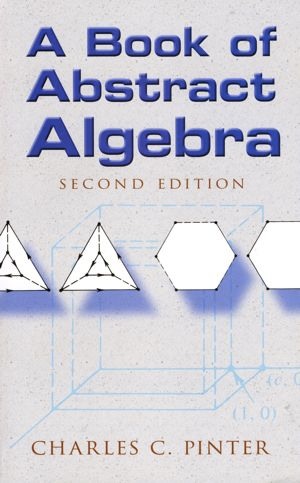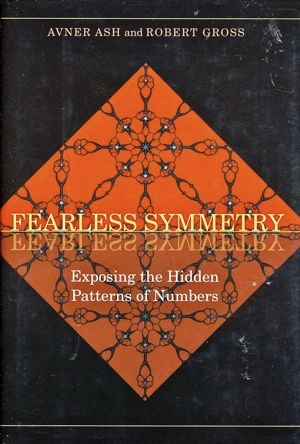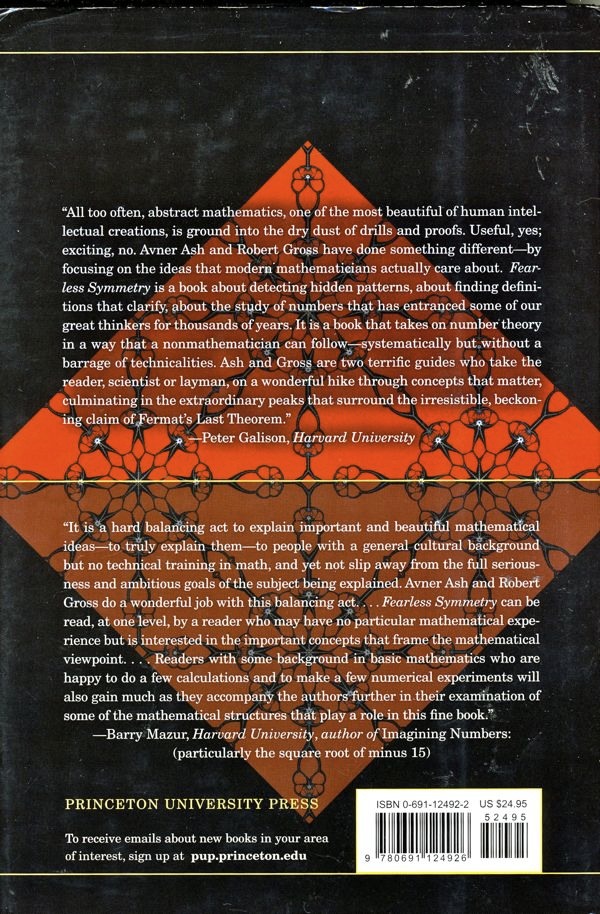April 24, 8:30 am Mathematics

Me: The air is fresh this morning. Ideal for mathematics. Continuing the first chapter of Pinter's "A Book of Abstract Algebra".
Pinter: "We must carefully note that the axiomatic method is not a way of discovering facts but of organizing them. New facts in mathematics are found, as often as not, by inspired guesses or experienced intuition. To be accepted, however, they should be supported by proof in an axiomatic system. [p. 12]
Me: True enough. But for most of us, the issue is not creating new math but deeply understanding whatever math we wish to use.
Pinter: "We choose to ignore the properties of the actual objects in a system of algebra (they may be numbers, or matrices, or whatever - we disregard what they are), and we turn our attention simply to the way they combine under the given operations." [p. 13]
Me: This is the heart of the matter. Algebra is a study one level removed from the actual objects that are particular exemplars of what is being studied.
Pinter: "... mathematicians slowly discovered that all the algebraic laws which hold in any system can be derived from a few simple, basic ones. This is a genuinely remarkable fact, for it parallels the discovery made by Euclid that a few very simple geometric postulates are sufficient to prove all the theorems of geometry.
Me: Why is this so? Why are the algebraic laws derivable from a few basic ones? I want to return to this later.
Pinter: "... when a mathematician nowadays speaks of a ring, the mathematician is referring to a set A with two operations, usually symbolized by + and . , having the following axioms: Addition is commutative and associative, it has a neutral element commonly symbolized by 0, and every element has an inverse -a with respect to addition. Multiplication is associative, has a neutral element 1, and is distributive over addition. ... Matrix algebra is an example of a ring ... there are many other examples of rings rings of numbers, rings of functions, rings of code 'words', rings of switching components, and a great many more." [p. 15]
Me: Got it. A ring is any set with 2 operations that satisfy a few basic axioms.
Pinter: "Nature presents us with a myriad of interwoven facts and sensations, and we are challenged at every instant to single out those which are immediately relevant and discard the rest. ... Nature is not made up of forces, velocities, and moments of inertia. Nature is a whole - nature simply is! The physicist isolates certain aspects of nature from the rest and finds the laws which govern these abstractions. It is the same with mathematics." [p. 16]
Me: Got it, again.
Pinter: "The movement toward axiomatics and abstraction in modern algebra began about the 1830s and was completed 100 years later." [p. 17]
Me: The 1830s were the time of Abel and Galois. But why does Pinter say that the task (of providing the axiomatic basis for algebra) was completed? Surely new systems will continue to be created and explored.
This completes Chapter One.
April 22, 7:30 am Mathematics
I am returning to my first academic love - mathematics.
I recall taking a course on Modern Algebra in 1962, and I remember the general feeling of not getting it. It it time to try again. This also seems to be a topic that is closely allied with the mathematics of symmetry.
Much of my study and note making will be with pen & paper. But the first chapter of the book I want to begin using sets the context and I can best capture this by noting the key points.
"A Book of Abstract Algebra" (1990) by Charles C. Pinter


Me: I also want to use the Dumbo feather to highlight the fact that I am making some serious notes about content. The second principle is to explicitly engage in a dialogue with the content. This gets at the "why" I find the content meaningful (or confusing).
Pinter: "I ... vowed never to perpetuate the falsehood that mathematics is purely - or primarily - a formalism." [p.xi]
Me: True. Treating mathematics as simply a formalism was popular in the 1960's, but it has now been recognized as a misleading and myopic viewpoint.
Pinter: "I have devoted a great deal of attention to bringing out the meaningfulness of algebraic concepts, by tracing these concepts to their origins in classical algebra and at the same time exploring their connections with other parts of mathematics, especially geometry, number theory, and aspects of computation and equation solving." [p. xi]
Me: I am attracted to the emphasis on meaningfulness. Meaningfulness is about connections. But there is no mention of symmetry in his statement. I think I will twin my reading by adding "Fearless Symmetry" by Ash & Gross to my study. I have added the back cover in a larger image so one can read the description.


Pinter: "... algebra is not only a technique, it is also a branch of learning, a discipline, like calculus or physics or chemistry." [p. 1]
Me: This is important. In school, algebra is emphasized as a technique. But in mathematics the word has a far broader meaning.
Pinter: "Ideas and general principles will take precedence over problem solving." [p. 1]
Me: Perfect. The issue is one of concepts and their inter-relationships. What kind of an idea is algebra?
Pinter: "... elementary algebra corresponds to the great classical age of algebra, which spans about 300 years from the sixteenth through the eighteenth centuries. It was during these years that the art of solving equations became highly developed and modern symbolism invented. ... Omar Khayyam, who is best remembered for his brilliant versus on wine, song, love, and friendship which are collected in the Rubaiyat - but who was also a great mathematician - explicitly defined algebra as the science of solving equations" [p.3]
Me: It is important to have a sense of the history and development of the idea of algebra. It is interesting that Omar Khayyam is best remembered for poetry rather than mathematics. Yet good mathematics is also poetry.
Pinter: "Progress was made in new parts of algebra, and algebra was linked to geometry with the invention of analytic geometry." [p. 6]
Me: This was Rene Descartes' great contribution to mathematics. We could now draw the graph of an equation. A truly great advance.
Pinter: "in 1824 Niels Abel proved that there does not exist any formula for the roots of an algebraic equation whose degree is 5 or greater. ... several mathematicians, working independently in Europe, began raising questions about algebra ... that had nothing to do with solving equations." [p. 6]
Me: Pinter then describes a new type of algebra, one involving operations with matrices. A matrix is simply a rectangular array of numbers. But these arrays can be added, subtracted, multiplied and divided according to well-defined rules. Another type of algebra involving sets was developed by George Boole and is now called Boolean algebra.
Pinter: "Other exotic algebras arose in a variety of contexts, often in connection with scientific problems. There were 'complex' and 'hypercomplex' algebras, algebras of vectors and tensors, and many others. Today it is estimated that over 200 different kinds of algebraic systems that have been studied..." [p. 10]
Me: I had no idea there were so many distinct algebras.
Pinter: "... the modern notion of algebraic structure. An algebraic structure is understood to be an arbitrary set, with one or more operations defined on it. ... Any set, with a rule (or rules) for combining its elements is already an algebraic structure. ... the purpose of algebra is to study algebraic structures." [p. 10 - 11]
Me: This is the clearest description of the present situation that I have seen. The first 10 pages of Pinter's book have been a delight. I am excited to be getting back into this. It has taken an hour and a half to read these ten pages, and to make these notes. And now I can finally add Mathematics to my list of activities.